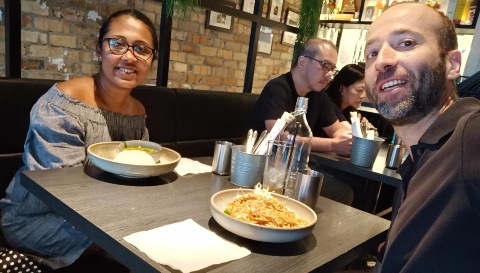Imagine how different the world would be if we all made a conscious decision to see things from other people’s perspectives?
That was the thought that occurred to me while chatting with Supipi Jayawardena, the 301st person I’ve met on my quest to have lunch with 500 strangers.
Supipi, who studied sociology, international relations and political science, has practised the surprisingly difficult task of empathy in both her professional and personal life.
In her native Sri Lanka, Supipi took part in back-channel negotiations between different parties in the country’s long-running civil war. To ensure the dialogue continued year after year, she and her colleagues had to actively listen to the different points of view in the room and help antagonists find common ground.
Supipi has used that same approach in her day-to-day life.
When I heard that she’d suffered racial abuse since moving to Australia, and I asked how those encounters had made her feel, she gave an answer that could’ve come directly from a peace negotiation.
Supipi said her first reaction had been to feel hurt and anger. But after calming down, she’d recognised that the other party had had certain experiences that had made them believe that verbally attacking a stranger was both justifiable and essential. So even if she couldn’t approve of their actions, she could understand where they were coming from.
It takes amazing strength and empathy to find compassion for those who wish you harm.
During her time in Australia, Supipi has lectured in globalisation and international politics, served as head of partnerships for the Australian Red Cross and, for the past nine months, served as the head of global strategic philanthropy for The Fred Hollows Foundation.
I really enjoyed my lunch with Supipi. It was so interesting to hear about her life experiences and so instructive to encounter her mindset.
It also made me realise how much we can learn when we first seek to understand before being understood.







Leave A Comment